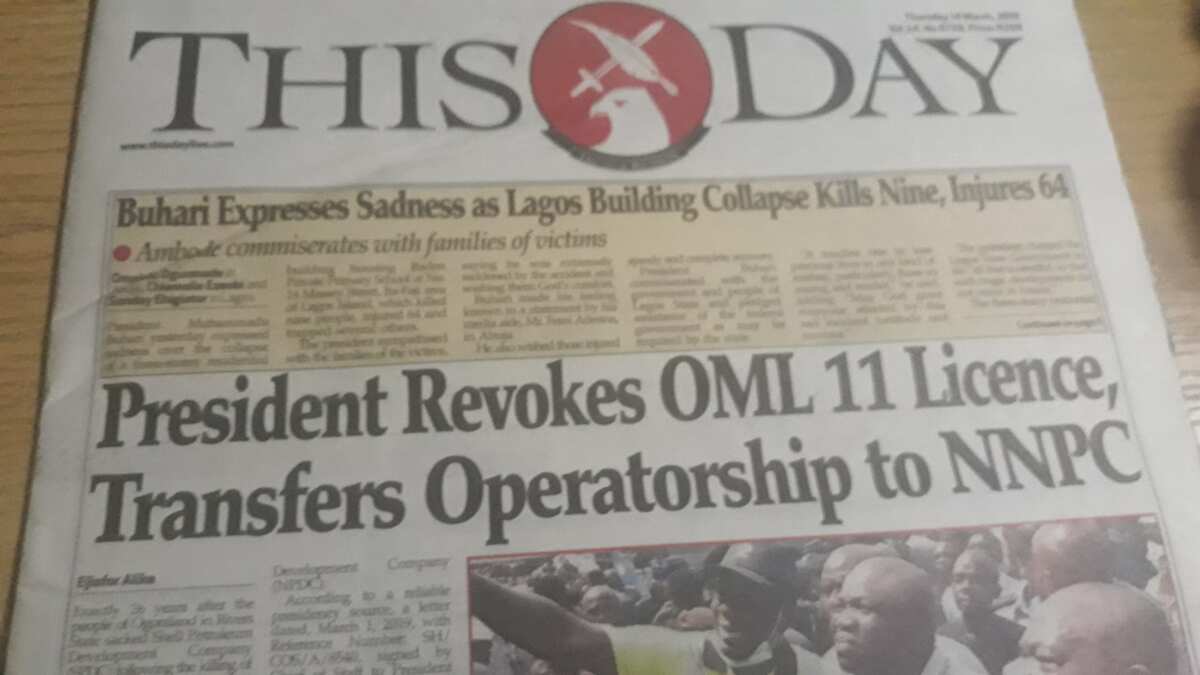The main headlines of the mainstream Nigerian newspapers for Thursday, March 14, 2019 are focused on the school building collapse at Ita-Faaji, Lagos Island, as rescue continues.
Nigerian Newspaper, The Nation, reports that no fewer than 18 persons died yesterday when a four-storey building collapsed on Lagos Island. Forty-one others were injured.
The incident occurred at No 14, Massey Street, Opposite Oja, Ita-Faaji.
The building, housing Ohen Private Nursery and Primary School on its third floor, caved in at about 10:20am, trapping scores of pupils.
READ ALSO: No plan to transfer CP Wakili from Kano - police
Lagos State Commissioner for Health, Jide Idris, who confirmed the casualty figure, said many of the rescued were taken to Lagos Island General Hospital, Lagos State University Teaching Hospital (LASUTH) and Lagos University Teaching Hospital (LUTH), among others.

Nigerian Newspaper Review for March 14: The Nation
Source: UGC
The Guardian reports that the General Manager of the Lagos State Building Control Agency (LASBCA) Olalekan Shodeinde confirmed that the building was indeed marked for demolition. But he explained that the owner stubbornly pressed on with modifications and let out the structure.
Governor Akinwunmi Ambode who visited the scene also said: “As you can see, some of the buildings have been marked for demolition. We get resistance from landlords. We will intensify efforts to see that occupants of those (buildings) that failed our integrity test are evacuated then we will bring such structures down.”

Nigerian Newspaper Review for March 14: The Guardian
Source: UGC
The Punch reports that reacting to the incident, President Muhammadu Buhari said he was extremely saddened by the collapse of the building, which claimed lives, including schoolchildren.
He condoled with the families of the victims and the Lagos state government, and wished those who were injured speedy recovery.

Nigerian Newspaper Review for March 14: The Punch
Source: UGC
PAY ATTENTION: Read the news on Nigeria’s #1 news app
Vanguard reports that the alleged militarization and massive rigging of the February 23 Presidential, National Assembly and March 9 Governorship, State Houses of Assembly and Federal Capital Territory, FCT, Area Council elections, threw the Senate into a rowdy session on March 13.

Nigerian Newspaper Review for March 14: Vanguard
Source: UGC
This Day reports that exactly 26 years after the people of Ogoniland in Rivers State sacked Shell Petroleum Development Company (SPDC) following the killing of Dr. Ken Saro-Wiwa, President Muhammadu Buhari has revoked the operating licence granted the oil giant for Oil Mining Lease (OML) 11, located in the area.

Nigerian Newspaper Review for March 14: This Day
Source: UGC
NAIJ.com (naija.ng) -> Legit.ng upgrades to serve you better.
2019 elections: Do you still trust INEC to conduct fair elections? - Nigerians speak| Legit TV
Source: Legit.ng
from Nigeria News today & Breaking Naija news ▷ Read on Legit.ng 24/7 https://ift.tt/2TGIQwh
via EDUPEDIA24/7
Comments
Post a Comment